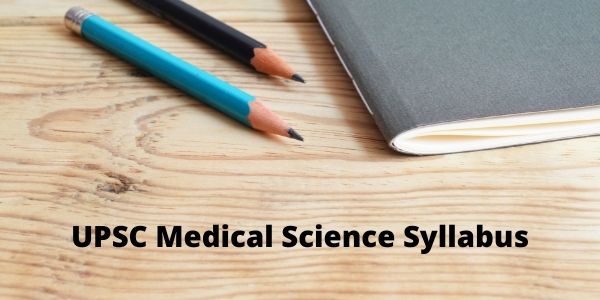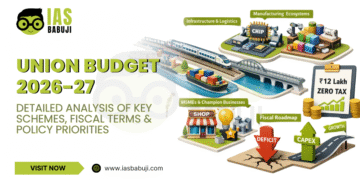To begin with, in this article, we have discussed the UPSC Medical Science Syllabus. Further, one needs to choose the right optional subject for the UPSC exam. Therefore, find the complete details of the UPSC medical science optional syllabus. So, if you are worried about the syllabus, read the complete article for more details on the same. In our earlier articles, you find details of the other optional subjects and books details.

Introduction
There are many optional subjects present in the UPSC exam. One can choose the optional subject according to your skills and interests. Then, in the IAS exam, there are three stages Prelims exam, it has two papers which are objective type. Then, there is the main exam, and it has a total of nine papers, which are of descriptive type. Lastly, there is an interview round. Further, talking about the optional subjects, there are 51 optional subjects in an IAS Exam. So, there are many things in the IAS exam. So, to know all the details related to the IAS exam, you can go through the official website.
Medical Science Optional
Medical Science is one of the optional subjects in the UPSC exam, and it is usually opted for by the students having a medical or science background. Besides, previous years have seen over 300 candidates opting for Medical Science as an optional subject in IAS Exams. To know the optional subjects and related details, you can go through them here; we have added all the details to help you with the exam. Now, below we will discuss the pros and cons of taking this subject as an optional subject.
Pros
- In the first place, the syllabus is usually static in nature.
- Further, students from the s with a BAMS or BDS graduate can take this optional as well.
- Then, the difficulty level is less when compred with MBBS. It also overlaps with that of MBBS as well.
Cons
- In the first place, the syllabus of the subject is vast and it can only be covered by the students having a medical background.
- Then, thiere is no overlapping of the syllabus with GS or other main paper.
- Further, there is a less probability of having coaching classes for this subject.
- It is essential for one to have agenuine interest in the subject and sometimes there are chances of asking clinical questions in the exam.
UPSC Medical Science Optional Syllabus
Now we will discuss the important part of the article. Below we have listed the essential topics for Paper 1
- Biochemistry
- Forensic medicine
- Human Anatomy
- Human Physiology
- Pathology
- Pharmacology
Then, below are the essential topics for Paper 2.
- Community Medicine
- Dermatology
- General Medicine
- General Surgery
- Pediatrics
- Obstetrics and Gynaecology

Paper I – UPSC Medical Science Optional Syllabus
Human Anatomy
- Applied anatomy including lower limbs and joints of the shoulder, hip, and knee, blood and nerve supply of upper and lymphatic drainage of tongue, thyroid, mammary gland, stomach and Gross anatomy, blood supply, and
- Applied anatomy of ,inguinal region, diaphragm, perineum
- Clinical anatomy of kidney, and vas deferens.
Human Physiology
- Conduction and transmission of impulse, posture and muscle tone, descending pathways, functions of the cerebellum, basal ganglia, Physiology of sleep and consciousness, mechanism of contraction, neuromuscular transmission, reflexes, control of equilibrium
Biochemistry
- Organ function tests-liver, kidney, thyroid.
- Restriction fragment length polymorphism (RFLP).
- Polymerase chain reaction (PCR).
- Radioimmunoassays (RIA).

Pathology
Differentiation between primary and metastatic malignancies, Pathogenesis, benign, malignant, and histopathology of bronchogenic carcinoma, ischemic heart disease, and diabetes mellitus.
Microbiology
Diseases caused by and laboratory diagnosis of-
- Meningococcus, Salmonella
- Shigella, Herpes, Dengue, Polio
Paper II
Now below, we have added the complete syllabus for paper 2
General Medicine
- Etiology, clinical features, diagnosis, and principles of mEtiology, clinical features, diagnosis, and principles of management of Tetanus, Rabies, AIDS, Dengue, Kala-azar, Japanese Encephalitis.
- Then, it contains Etiology, clinical features, diagnosis and principles of management of: Ischaemic heart disease, pulmonary embolism.
Pediatrics
This has Immunization, Baby-friendly hospital, congenital cyanotic heart disease, respiratory distress syndrome, broncho-pneumonias, kernicterus. IMNCI classification and management.
Dermatology
Psoriasis, Allergic dermatitis, vitiligo, Stevan Johnson’s syndrome, Lichen Planus.
Click on the below link to download the complete syllabus of the exam.
Preparation Strategy for the Medical Science
As we have already mentioned, this subject is vast. So, one must follow some strategy to complete the syllabus and get the best results in the exam.
- Know which are the important topics in Paper 1 and Paper 2 and try to refer to the previous year’s papers.
- In this subject, practicing the diagrams is important. Not all the questions need a diagram, but for some questions, you have to provide a diagram that will help you gain the marks. Besides, to make it more attractive, one can make use of color pencils, this will help you to score more.
- Then, try to study clinical and non-clinical topics together. It will help you understand the concepts easily.
- It is important for one to study from the MBBS textbooks as these textbooks cover all the topics that are essential for the UPSC exam.
- Further, while writing the answer, try to answer directly instead of writing useless information or extra. Further, it is vital to give proper headings and sub-heading. Besides, try to highlight important points that will make your answer attractive.
- Then, try to add a diagram wherever it is necessary that will help you fetch good marks.
Suggestions and Tips for the exam
Now let us understand some of the tips for the IAS exam in general. Look at the below tips and try to use them in the exam.
- In the first place, it is essential for one to know the complete syllabus and the exam pattern. If you know the exam syllabus, it will be easy for one to study for the exam.
- Then, one must refer to the previous year’s papers that will give you a brief understanding of the questions. Further, you will come to know paper patterns, marks, topics, etc. So, try to solve as many papers as possible for the exam.
- Revision plays a major role in any exam, so one must give some time to do revise all the concepts. It will help you to remember concepts and with the exam. One can also give a mock test, and it will give you the feel of the final year paper. Many platforms offer you mock tests. Try to study for 10 to 12 hours daily, but it also varies from one person to the other.
- Make the best use of available time and give time for all the subjects, including revision. Then, one must visit the official website to know about the exam dates, results, and other details. Besides, one must also take care of the health, as it essential for one to fit to write the exam.
Click Here to get all the details of the IAS exam, and you will find the exam syllabus, tips, books, and other details.
Conclusion – UPSC Medical Science Syllabus
To conclude, in the article, we have added all information of the UPSC Medical Science Optional Syllabus. Further, it will be easy if you are from a medical background. Choosing the optional subject plays a vital role in the UPSC exam. In our earlier articles, we have covered all the details of the other optional subject. As we all know, the IAS has the longest syllabus, and one needs to cover everything to get the best results in the exam. Further, to cover the complete syllabus, you have an option of joining the classes. If you join classes, it comes with many benefits. It depends on one person to the other. However, many have cleared the exam with the best scores without taking classes on their first attempt. Then, this exam will not only check your knowledge but also your hard work towards your goals.

FAQs
Then, we have added some FAQs for more details on the topic mentioned above.
Yes, it is one of the popular optional subjects. But, if you are from a medical background, it will be the best option for the exam.
One must understand the complete syllabus of the paper. Then, understand the which are the important topics and study from the best books.
The syllabus is mainly about the basic understanding of medicine and its applications. So, one can read the above article for more details.
Yes, but one can clear the exam with the right plan and hard work. It is tough as it has the longest syllabus, and one needs to cover it to get the best results in the exam.
Yes, one can study on their own for the IAS exam as we have seen people who have cleared the exam by self-study. So, if you are confident, you can go for this option.
Editor’s Note | UPSC Medical Science Syllabus
In the above article, you will get the details on the UPSC medical science optional syllabus. As mentioned above, it is good to take up this subject if you are from the same background. It will help you to understand the concept well. However, if you are not from the same background, try to take another subject as it will be tough to know the topics. This article will give you all the essential details on the UPSC Medical Science Syllabus.
Then, download the syllabus from the provided link above, and we have also provided some tips that will help you with the exam. We know that it is not easy to study for this exam. But many have cleared the exam. It means even you can clear the with the right plan and direction. This exam is also about hard work and patience to prepare yourself and give your hundred percent. We wish you good luck with the exam, work hard and study smart.






